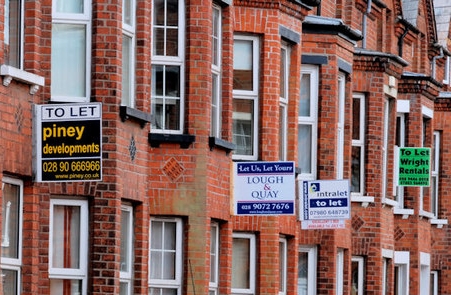 Vulnerable tenants are being pushed out of the private housing market because of rising rents and benefits cuts, experts have warned.
Vulnerable tenants are being pushed out of the private housing market because of rising rents and benefits cuts, experts have warned.
According to a survey of private landlords by the Royal Institution of Chartered Surveyors, rents are predicted to rise by 20% over the next five years, while house prices are projected to increase by around 18% over the same period.
Sean Tompkins, RICS chief executive officer, said: “We see this as a matter of public interest. The housing market is falling increasingly out of step with the majority of household incomes. In the current climate, it can be hard enough for young professionals to make ends meet. But for those on benefits, the pressures may be insurmountable.
“Worryingly our figures show that as a result of a combination of economic pressures, more and more vulnerable tenants are being pushed out of the private rented sector. However, if government were to put in place additional support measures through the introduction of help to rent schemes, the door to the rental market may once again be opened for Britain’s most vulnerable.”
Recent caps to benefits were cited by 29% of landlords as a key reason why those on lower incomes were being pushed out of the rental market.
Over half (52%) of landlords questioned said that they would consider letting properties to households in receipt of housing benefits or were homeless if the government provided financial guarantees for both deposits and rent.
The survey also showed that across the country the shortage of available properties to rent is continuing to grow, with tenant demand exceeding the number of new instructions on the market for the thirty-eighth consecutive month and by an increasing margin.
Jon Sparkes, chief executive of Crisis, said the survey highlighted the “uphill battle” homeless people face when trying to enter the private rented sector.
“Renting is often the only way out of homelessness, but the vast majority of landlords now consider it too risky to rent to homeless people. This is a desperate situation to be in: to be ready to move on and start rebuilding your life only to encounter financial barriers and closed doors,” he said.
“With growing numbers of people stuck in this homelessness trap, we need to find ways to reassure landlords whilst supporting homeless people to find a place to live.”
Last year, the government increased stamp duty on second homes as part of its plans to curb the buy-to-let market and free up property for first-time buyers.
From April, mortgage interest relief for residential buy-to-let properties is also set to be reduced to the base income tax rate, which is 20%.
Experts believe that changes to stamp duty and mortgage interest tax relief will push up rents as landlords look to claw back lost income.
Landlords are also likely to pull out of the market, leading to tenants competing for fewer properties and prices rising.
The proportion of people living in the expensive private rented sector has doubled since 2000 and more than 2.2 million working households with below-average incomes spend a third or more of their disposable income on housing.
David Smith, policy director at the Residential Landlords Association, said: “Today’s survey is a reminder that it is tenants who will ultimately suffer as a result of the Government’s punitive tax changes.
“We need a tax system that supports rather than hinders housing growth but yesterday’s budget did nothing to achieve this despite repeated warnings from the RLA and others over the last 18 months that these changes would have negative effects on landlords and tenants.
“Even at this late stage we call on all sides to work with the RLA as it develops its own blueprint for a sector that provides the homes to rent we so desperately need.”










 Buy-to-let
Buy-to-let











